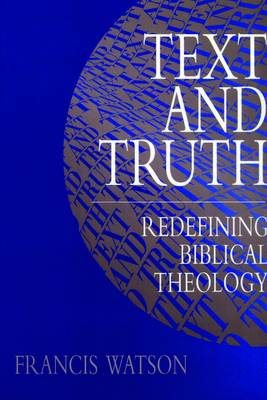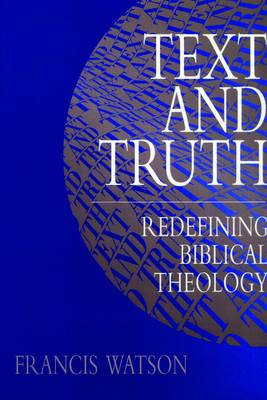
- Afhalen na 1 uur in een winkel met voorraad
- Gratis thuislevering in België vanaf € 30
- Ruim aanbod met 7 miljoen producten
- Afhalen na 1 uur in een winkel met voorraad
- Gratis thuislevering in België vanaf € 30
- Ruim aanbod met 7 miljoen producten
Zoeken
Omschrijving
This is a print on demand book and is therefore non- returnable. The disciplines of biblical studies and systematic theology have in modern times been practised in relative isolation from one another. Francis Watson argues that the separate development of Old and New Testament studies and systematic theology impoverishes all three disciplines and distorts the object of their study. In the past, a 'biblical theology' that took seriously the theological responsibilities of the biblical interpreter was criticised by some scholars as detrimental to the practice of both the exegetical and the theological disciplines. Here Francis Watson argues for more theological involvement with exegesis and hermeneutics rather than less: biblical theology, he contends, must be practised in an interdisciplinary approach that can draw freely on the resources and perspectives of the two exegetical disciplines and of systematic theology. The first part of the book examines particular themes in theological hermeneutics. Contemporary hermeneutical debates -- such as the relationship of history-writing and fiction, textual indeterminacy, and interpretative pluralism -- are engaged from an explicitly theological point of view. The second part analyses Christian theological use of the Old Testament. It advocates an approach to Old Testament interpretation in which the retrospective Christian re-reading of Jewish scripture as preparing the way for the coming of Christ is once again taken seriously. This work builds on Francis Watson's previous book Text, Church and World: Biblical Interpretation in Theological Perspective (Eerdmans, 1994) in advocating an approach in which biblical interpretation seeks to contribute directly to the work of Christian theological construction. It is only through this interdisciplinary approach, Watson contends, that the Bible will be interpreted in a manner consistent with its status as the holy scripture of the Christian community.
Specificaties
Betrokkenen
- Auteur(s):
- Uitgeverij:
Inhoud
- Aantal bladzijden:
- 352
- Taal:
- Engels
Eigenschappen
- Productcode (EAN):
- 9780802833013
- Verschijningsdatum:
- 19/05/1997
- Uitvoering:
- Paperback
- Formaat:
- Trade paperback (VS)
- Afmetingen:
- 152 mm x 229 mm
- Gewicht:
- 521 g

Alleen bij Standaard Boekhandel
+ 87 punten op je klantenkaart van Standaard Boekhandel
Beoordelingen
We publiceren alleen reviews die voldoen aan de voorwaarden voor reviews. Bekijk onze voorwaarden voor reviews.











